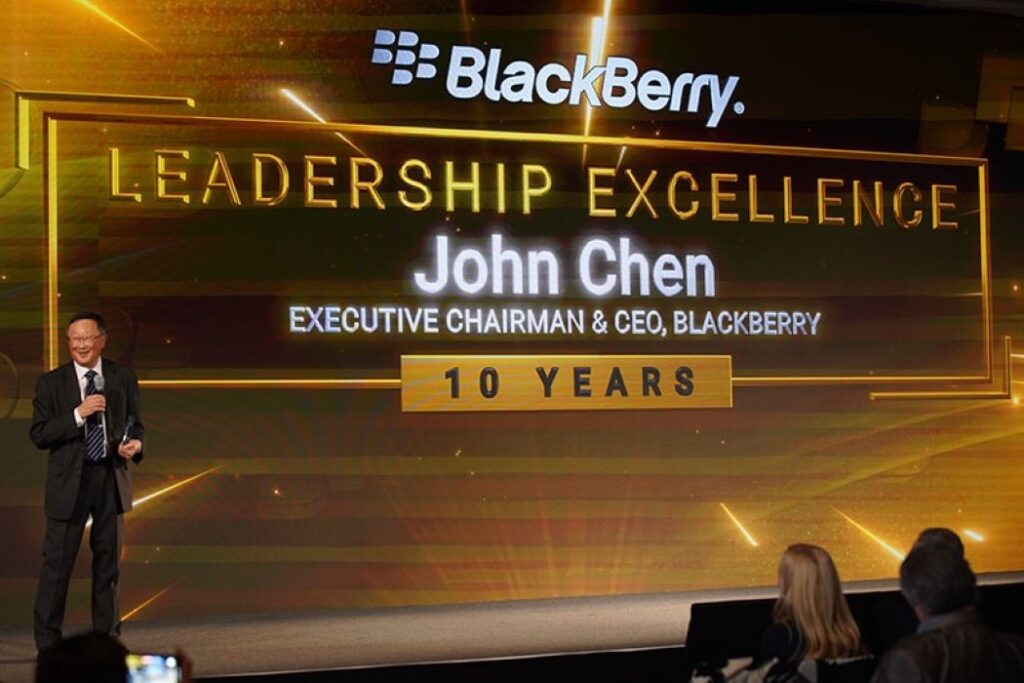BlackBerry has been attempting to revive shareholder interest over the past year.
BlackBerry has officially announced the retirement of John Chen, its CEO and executive chair of 10 years.
First reported by The Globe and Mail, BlackBerry announced the news Monday evening. The leadership change follows recent attempts by BlackBerry to reinvigorate shareholder interest under Chen’s leadership. In May, the company announced it was exploring “strategic alternatives to drive enhanced shareholder value.”
Incoming interim CEO Richard Lynch joined BlackBerry board’s in 2013.
Among these alternatives included the separation of “one or more of BlackBerry’s businesses,” which the company followed through with earlier this month by announcing plans to split its internet of things (IoT) business from its cybersecurity offerings. BlackBerry plans to complete an initial public offering for its IoT business by June 2024.
The company said that Chen will retire upon the completion of his contract, which is set to expire November 3, and will be succeeded by current board member Richard “Dick” Lynch on an interim basis.
In the last decade, BlackBerry’s business has shifted dramatically from its origins as a mobile phone company. Chen began his tenure at BlackBerry in 2013 as the company was losing significant market share in the mobile phone market to players like Apple, and just months after it cut 4500 jobs, putting its future into question.
Under Chen’s leadership, BlackBerry pivoted from a consumer-oriented mobile phone manufacturer to an enterprise security and IoT solutions provider. The company has made several sizable deals on these fronts over the last decade, including a Ford partnership in 2016, and a $1.4-billion acquisition of Cylance in 2019.
RELATED: BlackBerry considering breaking up its businesses to improve revenue, cash flow
“The BlackBerry board of directors would like to express its gratitude to John for his decade of strong leadership. His achievement of saving BlackBerry and repositioning it as a software company with leading cybersecurity and IoT technologies has been remarkable,” said Prem Watsa, lead director of the BlackBerry board, in a statement.
Chen addressed conversations around his contract at an investor briefing in New York last week, saying it was important for him to wait until the board officially decided to go through with the company split before having conversations about his contract.
“It’s now time for me and the board to sit together and [ask] what value I add, [if] I ever had any value, or what value I add going forward,” said Chen at the time.
Incoming interim CEO and executive chair Lynch joined the BlackBerry board in 2013 and serves as as a member of its compensation, nomination and governance committee, according to a statement from the company. He previously served as executive vice-president and chief technology officer at Verizon and is a director at mobile technology company Cohere Technologies, not to be confused with the Toronto-based AI company.
“The board has determined that it is in the best interests of the company to appoint interim executive management to provide continued stability and continuity for BlackBerry as we work through the transition to a new permanent CEO,” Watsa said in a statement. “With his deep industry experience and strong leadership track record, Dick is well-positioned to continue advancing our strategy with the Board’s ongoing support and insight.”
BlackBerry’s investors reacted favourably to the news, with its stock jumping to $5.00 per share or roughly 20 cents up, on Monday evening. The jump follows a decline from $6.00 per share after announcing the company split earlier this month.
Feature image courtesy BlackBerry.

